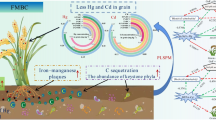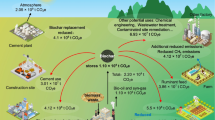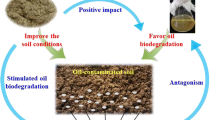Abstract
Bioremediation of total petroleum hydrocarbon (TPH) in contaminated soil is an environmentally friendly and inexpensive method, but the low rate of bioremediation is an important factor limiting its development. As one kind of urban garbage classification, the resource utilization of kitchen waste is the focus of attention. In this study, the effect of the organic amendment (OA) from kitchen waste composting on TPH removal efficiency in soil without or with petroleum hydrocarbon-degrading bacteria (PHDB) was investigated. After 35 days of soil remediation, TPH removal efficiency were 37.2 ± 1.2% and 51.9 ± 0.9% in OA group (without PHDB) and OA-DB group (with PHDB). Furthermore, TPH removal efficiency in OA group and OA-DB group with 50 g/kg OA can reach 72.8 ± 1.1% and 78.3 ± 0.3%. The half-life decreased from 52.5 d to 17.5 d for OA group and from 31.4 to 15.3 d for OA-DB group. The addition of OA can improve the degradation efficiency for long-chain hydrocarbons (C16–C23) and heavy fraction (C24-C39), as OA can maintenance of high dehydrogenase, urease and catalase activity in TPH contaminated soil. The compost products of kitchen waste can increase the rate of bioremediation of TPH in soil, this provides a new idea for the utilization of kitchen waste as a soil remediation agent.






Similar content being viewed by others
Data Availability
All data generated or analyzed during this study are included in this published article.
References
Abtahi, H., et al. (2020). Effect of competition between petroleum-degrading bacteria and indigenous compost microorganisms on the efficiency of petroleum sludge bioremediation: Field application of mineral-based culture in the composting process. Journal of Environmental Management, 258, 110013. https://doi.org/10.1016/j.jenvman.2019.110013
Ajeng, A. A., Abdullah, R., Ling, T. C., & Ismail, S. (2022). Adhesion of Bacillus salmalaya and Bacillus amyloliquefaciens on oil palm kernel shell biochar: A physicochemical approach. Journal of Environmental Chemical Engineering, 10, 107115. https://doi.org/10.1016/j.jece.2021.107115
Akbari, A., & Ghoshal, S. (2014). Pilot-scale bioremediation of a petroleum hydrocarbon-contaminated clayey soil from a sub-Arctic site. Journal of Hazardous Materials, 280, 595–602. https://doi.org/10.1016/j.jhazmat.2014.08.016
Akbari, A., David, C., Rahim, A. A., & Ghoshal, S. (2021). Salt selected for hydrocarbon-degrading bacteria and enhanced hydrocarbon biodegradation in slurry bioreactors. Water Research, 202, 117424. https://doi.org/10.1016/j.watres.2021.117424
AlKaabi, N., Al-Ghouti, M. A., Jaoua, S., & Zouari, N. (2020). Potential for native hydrocarbon-degrading bacteria to remediate highly weathered oil-polluted soils in Qatar through self-purification and bioaugmentation in biopiles. Biotechnology Reports, 28, e543. https://doi.org/10.1016/j.btre.2020.e00543
An, Y., Li, G. M., Wu, W. Q., Huang, J. W., He, W. Z., & Zhu, H. C. (2014). Generation, collection and transportation, disposal and recycling of kitchen waste: A case study in Shanghai. Waste Management and Research, 32, 245–248. https://doi.org/10.1177/0734242X14521685
Behera, I. D., Nayak, M., Biswas, S., Meikap, B. C., & Sen, R. (2021). Enhanced biodegradation of total petroleum hydrocarbons by implementing a novel two-step bioaugmentation strategy using indigenous bacterial consortium. Journal of Environmental Management, 292, 112746. https://doi.org/10.1016/j.jenvman.2021.112746
BidjaAbena, M. T., Li, T., Shah, M. N., & Zhong, W. (2019). Biodegradation of total petroleum hydrocarbons (TPH) in highly contaminated soils by natural attenuation and bioaugmentation. Chemosphere, 234, 864–874. https://doi.org/10.1016/j.chemosphere.2019.06.111
Bojes, H. K., & Pope, P. G. (2007). Characterization of EPA’s 16 priority pollutant polycyclic aromatic hydrocarbons (PAHs) in tank bottom solids and associated contaminated soils at oil exploration and production sites in Texas. Regulatory Toxicology and Pharmacology, 47, 288–295. https://doi.org/10.1016/j.yrtph.2006.11.007
Campos, J. A., Peco, J. D., & Garcia-Noguero, E. (2019). Antigerminative comparison between naturally occurring naphthoquinones and commercial pesticides. Soil dehydrogenase activity used as bioindicator to test soil toxicity. Science of the Total Environ, 694. https://doi.org/10.1016/j.scitotenv.2019.133672
Chabot, M., Morales, E., Cummings, J., Rios, N., Giatpaiboon, S., & Mogul, R. (2020). Simple kinetics, assay, and trends for soil microbial catalases. Analytical Biochemistry, 610. https://doi.org/10.1016/j.ab.2020.113901
Feng, L., Jiang, X., Huang, Y., Wen, D., Fu, T., & Fu, R. (2021). Petroleum hydrocarbon-contaminated soil bioremediation assisted by isolated bacterial consortium and sophorolipid. Environmental Pollution, 273, 116476. https://doi.org/10.1016/j.envpol.2021.116476
Gao, X., et al. (2022). Humification and maturation of kitchen waste during indoor composting by individual households. The Science of the Total Environment, 814, 152509. https://doi.org/10.1016/j.scitotenv.2021.152509
Gennadiev, A. N., Pikovskii, Y. I., Tsibart, A. S., & Smirnova, M. A. (2015). Hydrocarbons in soils: Origin, composition, and behavior (Review). Eurasian Soil Science, 48, 1076–1089. https://doi.org/10.1134/S1064229315100026
He, X. S., **, B. D., Wei, Z. M., Guo, X. J., Li, M. X., An, D., & Liu, H. L. (2011). Spectroscopic characterization of water extractable organic matter during composting of municipal solid waste. Chemosphere, 82, 541–548. https://doi.org/10.1016/j.chemosphere.2010.10.057
Hoang, S. A., et al. (2021). Mitigation of petroleum-hydrocarbon-contaminated hazardous soils using organic amendments: A review. Journal of Hazardous Materials, 416, 125702. https://doi.org/10.1016/j.jhazmat.2021.125702
Huettel, M. (2022). Oil pollution of beaches. Current Opinion in Chemical Engineering, 36, 100803. https://doi.org/10.1016/j.coche.2022.100803
Jabbar, N. M., Alardhi, S. M., Mohammed, A. K., Salih, I. K., & Albayati, T. M. (2022). Challenges in the implementation of bioremediation processes in petroleum-contaminated soils: A review. Environmental Nanotechnology, Monitoring & Management, 18, 100694. https://doi.org/10.1016/j.enmm.2022.100694
Kasar, P., Sharma, D. K., & Ahmaruzzaman, M. (2020). Thermal and catalytic decomposition of waste plastics and its co-processing with petroleum residue through pyrolysis process. Journal of Cleaner Production, 265, 121639. https://doi.org/10.1016/j.jclepro.2020.121639
Kharola, S., et al. (2022). Barriers to organic waste management in a circular economy. Journal of Cleaner Production, 362, 132282. https://doi.org/10.1016/j.jclepro.2022.132282
Koolivand, A., Rajaei, M. S., Ghanadzadeh, M. J., Saeedi, R., Abtahi, H., & Godini, K. (2017). Bioremediation of storage tank bottom sludge by using a two-stage composting system: Effect of mixing ratio and nutrients addition. Bioresource Technology, 235, 240–249. https://doi.org/10.1016/j.biortech.2017.03.100
Leno, N., Sudarmaidevi, C. R., Byju, G., Thampatti, K. C. M., Krishnaprasad, P. U., Jacob, G., & Gopinath, P. P. (2021). Thermochemical digestate fertilizer from solid waste: Characterization, labile carbon dynamics, dehydrogenase activity, water holding capacity and biomass allocation in banana. Waste Management, 123, 1–14. https://doi.org/10.1016/j.wasman.2021.01.002
Li, C. Y., et al. (2016). The biofilm property and its correlationship with high-molecular-weight polyacrylamide degradation in a water injection pipeline of Daqing oilfield. Journal of Hazardous Materials, 304, 388–399. https://doi.org/10.1016/j.jhazmat.2015.10.067
Li, Q., et al. (2020a). Effects of co-contamination of heavy metals and total petroleum hydrocarbons on soil bacterial community and function network reconstitution. Ecotoxicology and Environmental Safety, 204, 111083. https://doi.org/10.1016/j.ecoenv.2020.111083
Li, Q., Huang, Y., Wen, D., Fu, R., & Feng, L. (2020b). Application of alkyl polyglycosides for enhanced bioremediation of petroleum hydrocarbon-contaminated soil using Sphingomonas changbaiensis and Pseudomonas stutzeri. Science of the Total Environment, 719, 137456. https://doi.org/10.1016/j.scitotenv.2020.137456
Li, Y., Zhang, J., Li, Y., Chen, J., & Du, W. (2022). Treatment of soil contaminated with petroleum hydrocarbons using activated persulfate oxidation, ultrasound, and heat: A kinetic and thermodynamic study. Chemical Engineering Journal, 428, 131336. https://doi.org/10.1016/j.cej.2021.131336
NkhalambayausiChirwa, E. M., Lutsinge-Nembudani, T. B., Fayemiwo, O. M., & Bezza, F. A. (2021). Biosurfactant assisted degradation of High Molecular Weight Polycyclic Aromatic Hydrocarbons by mixed cultures from a car service oil dump from Pretoria Central Business District (South Africa). Journal of Cleaner Production, 290, 125183. https://doi.org/10.1016/j.jclepro.2020.125183
Polyak, Y. M., Bakina, L. G., Chugunova, M. V., Mayachkina, N. V., Gerasimov, A. O., & Bure, V. M. (2018). Effect of remediation strategies on biological activity of oil-contaminated soil-A field study. International Biodeterioration & Biodegradation, 126, 57–68. https://doi.org/10.1016/j.ibiod.2017.10.004
Qin, J., Lin, C., Almebayedh, H., & Albader, M. (2019). Decomposition of long-chain petroleum hydrocarbons by Fenton-like processes: Effects of ferrous iron source, salinity and temperature. Ecotoxicology and Environmental Safety, 169, 764–769. https://doi.org/10.1016/j.ecoenv.2018.11.086
Richard, F., Southern, I., Gigauri, M., Bellini, G., Rojas, O., & Runde, A. (2021). Warning on nine pollutants and their effects on avian communities. Glob Ecol Conserv, 32, e1898. https://doi.org/10.1016/j.gecco.2021.e01898
Ruiz, O. N., et al. (2021). Metagenomic characterization reveals complex association of soil hydrocarbon-degrading bacteria. International Biodeterioration & Biodegradation, 157, 105161. https://doi.org/10.1016/j.ibiod.2020.105161
Sajid, S., et al. (2022). Pretreatment of rice straw by newly isolated fungal consortium enhanced lignocellulose degradation and humification during composting. Bioresource Technology, 354, 127150. https://doi.org/10.1016/j.biortech.2022.127150
Segata, N., Izard, J., Waldron, L., Gevers, D., Miropolsky, L., Garrett, W. S., & Huttenhower, C. (2011). Metagenomic biomarker discovery and explanation. Genome Biology, 12, R60. https://doi.org/10.1186/gb-2011-12-6-r60
Song, B., Tang, J. C., Zhen, M. N., & Liu, X. M. (2019). Effect of rhamnolipids on enhanced anaerobic degradation of petroleum hydrocarbons in nitrate and sulfate sediments. Science of the Total Environment, 678, 438–447. https://doi.org/10.1016/j.scitotenv.2019.04.383
Su, D., Chen, X., Wei, X., Liang, J., Tang, L., & Wang, L. (2021). Comparison of thermal stability between dicyclopentadiene/hydrogenated dicyclopentadiene petroleum resin: Thermal decomposition characteristics, kinetics and evolved gas analysis by TGA/TG-MS. Thermochimica Acta, 699, 178853. https://doi.org/10.1016/j.tca.2020.178853
Suda, K., et al. (2021). Methanogenic crude oil degradation induced by an exogenous microbial community and nutrient injections. Journal of Petroleum Science and Engineering, 201, 108458. https://doi.org/10.1016/j.petrol.2021.108458
Trinadha Rao, V., Suneel, V., Raajvanshi, I., Alex, M. J., & Thomas, A. P. (2022). Year-to-year variability of oil pollution along the Eastern Arabian Sea: The impact of COVID-19 imposed lock-downs. Marine Pollution Bulletin, 175, 113356. https://doi.org/10.1016/j.marpolbul.2022.113356
Ubani, O., Atagana, H. I., Selvarajan, R., & Ogola, H. J. (2022). Unravelling the genetic and functional diversity of dominant bacterial communities involved in manure co-composting bioremediation of complex crude oil waste sludge. Heliyon, 8, e8945. https://doi.org/10.1016/j.heliyon.2022.e08945
Varjani, S. J. (2017). Microbial degradation of petroleum hydrocarbons. Bioresource Technology, 223, 277–286. https://doi.org/10.1016/j.biortech.2016.10.037
Wang, X. Z., et al. (2016). Separating and characterizing functional alkane degraders from crude-oil-contaminated sites via magnetic nanoparticle-mediated isolation. Research in Microbiology, 167, 731–744. https://doi.org/10.1016/j.resmic.2016.07.004
Wang, L., Cheng, Y., Naidu, R., & Bowman, M. (2021). The key factors for the fate and transport of petroleum hydrocarbons in soil with related in/ex situ measurement methods: An overview. Frontiers in Environmental Science, 9. https://doi.org/10.3389/fenvs.2021.756404
Wu, M., Guo, X., Wu, J., & Chen, K. (2020). Effect of compost amendment and bioaugmentation on PAH degradation and microbial community shifting in petroleum-contaminated soil. Chemosphere, 256, 126998. https://doi.org/10.1016/j.chemosphere.2020.126998
**ao, R., Ali, A., Wang, P., Li, R., Tian, X., & Zhang, Z. (2019). Comparison of the feasibility of different washing solutions for combined soil washing and phytoremediation for the detoxification of cadmium (Cd) and zinc (Zn) in contaminated soil. Chemosphere, 230, 510–518. https://doi.org/10.1016/j.chemosphere.2019.05.121
Xue, J., et al. (2022). Responses of seawater bacteria in the bioremediation process of petroleum contamination by immobilized bacteria. Journal of Environmental Chemical Engineering, 10, 107133. https://doi.org/10.1016/j.jece.2022.107133
Yousaf, U., et al. (2022). Interactive effect of biochar and compost with Poaceae and Fabaceae plants on remediation of total petroleum hydrocarbons in crude oil contaminated soil. Chemosphere, 286, 131782. https://doi.org/10.1016/j.chemosphere.2021.131782
Yuan, Y., et al. (2017). Compost-derived humic acids as regulators for reductive degradation of nitrobenzene. Journal of Hazardous Materials, 339, 378–384. https://doi.org/10.1016/j.jhazmat.2017.06.047
Zhang, B., Guo, Y., Huo, J., **e, H., Xu, C., & Liang, S. (2020). Combining chemical oxidation and bioremediation for petroleum polluted soil remediation by BC-nZVI activated persulfate. Chemical Engineering Journal, 382, 123055. https://doi.org/10.1016/j.cej.2019.123055
Zhang, J., Feng, W., & Xue, Q. (2022). Biosurfactant production and oil degradation by Bacillus siamensis and its potential applications in enhanced heavy oil recovery. International Biodeterioration & Biodegradation, 169, 105388. https://doi.org/10.1016/j.ibiod.2022.105388
Zhao, Y., Wang, Y., Sun, S., Liu, W., Zhu, L., & Yan, X. (2022). Different forms and proportions of exogenous nitrogen promote the growth of alfalfa by increasing soil enzyme activity. Plants-Basel, 11. https://doi.org/10.3390/plants11081057
Zhaoxiang, W., Huihu, L., Qiaoli, L., Changyan, Y., & Faxin, Y. (2020). Application of bio-organic fertilizer, not biochar, in degraded red soil improves soil nutrients and plant growth. Rhizosphere, 16, 100264. https://doi.org/10.1016/j.rhisph.2020.100264
Zhong, J. N., et al. (2017). Degradation pathways of 1-methylphenanthrene in bacterial Sphingobium sp MP9-4 isolated from petroleum-contaminated soil. Marine Pollution Bulletin, 114, 926–933. https://doi.org/10.1016/j.marpolbul.2016.11.020
Zhu, L., Jia, X., Li, M., Wang, Y., Zhang, J., Hou, J., & Wang, X. (2021). Associative effectiveness of bio-organic fertilizer and soil conditioners derived from the fermentation of food waste applied to greenhouse saline soil in Shan Dong Province, China. Applied Soil Ecology, 167, 104006. https://doi.org/10.1016/j.apsoil.2021.104006
Acknowledgements
This work was supported by the National Key Research and Development Program of China (2018YFA0901300), the National Natural Science Foundation of China (Grant No.: 22078149), Key Research and Development Program of Jiangsu Provice (No. BE2023360) and Jiangsu Agriculture Science and Technology Innovation Fund (CX(23)3019).
Author information
Authors and Affiliations
Corresponding authors
Ethics declarations
Competing Interests
The authors declare no competing interests.
Additional information
Publisher's Note
Springer Nature remains neutral with regard to jurisdictional claims in published maps and institutional affiliations.
Rights and permissions
Springer Nature or its licensor (e.g. a society or other partner) holds exclusive rights to this article under a publishing agreement with the author(s) or other rightsholder(s); author self-archiving of the accepted manuscript version of this article is solely governed by the terms of such publishing agreement and applicable law.
About this article
Cite this article
Zhou, H., Yin, J., Song, T. et al. Application of Organic Amendment from Kitchen Waste Composting for Enhanced Bioremediation of Petroleum Hydrocarbon-Contaminated Soil. Water Air Soil Pollut 235, 36 (2024). https://doi.org/10.1007/s11270-023-06860-1
Received:
Accepted:
Published:
DOI: https://doi.org/10.1007/s11270-023-06860-1




